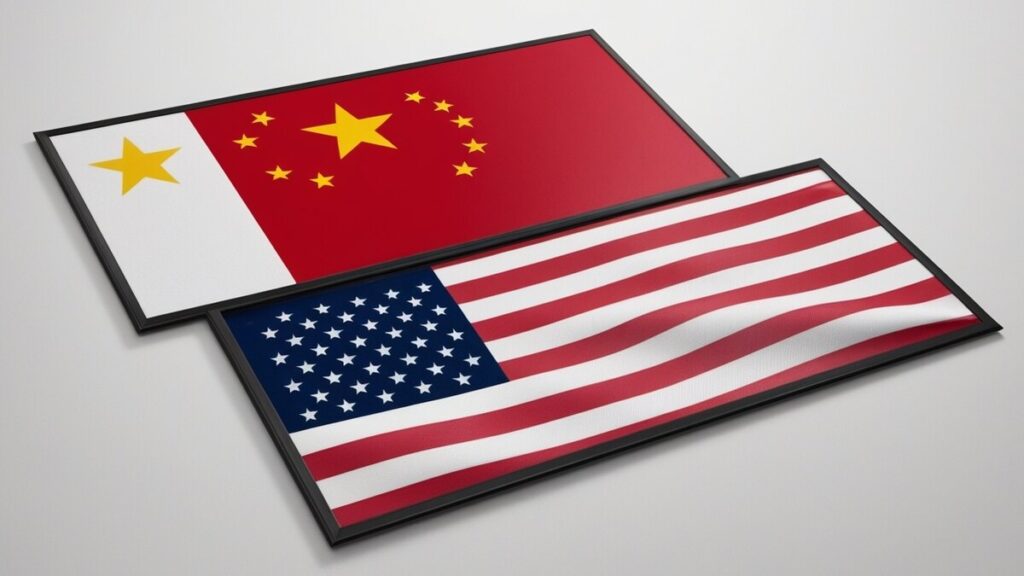Introduction: The Global Stakes of the U.S. China Tech Competition
In 2024, the U.S. China Tech Competition isn’t just about who leads in artificial intelligence or semiconductor production. It’s about shaping the future of the digital world and establishing new global technology standards. This competition has set off a series of global ripples, influencing everything from security and economic growth to ethical considerations in tech competition
- Introduction: The Global Stakes of the U.S. China Tech Competition
- The Origins of the U.S. China Tech Rivalry
- Major Areas of Competition
- U.S. China Tech Competition Winners: Who Leads in Technology?
- Will China Surpass the U.S. in Technology?
- Economic Impact of the Tech Race
- Impact on Global Technology Standards
- Security Concerns and Cyber Warfare
- Influence on Global Alliances and Trade Blocs
- The Impact on Innovation and Startups
- Environmental and Ethical Implications
- The Future of Technological Collaboration
- Conclusion: Navigating a New Tech-Driven Era
The Origins of the U.S. China Tech Rivalry
The U.S. China Tech Competition stems from two main forces: the quest for national power and economic influence. Both nations understand that technological leadership is essential for maintaining economic resilience and defense capabilities. From AI to 5G, tech innovation has become a new currency in global relations.
The Role of Innovation and Technology in National Power
Technology has historically driven progress, but today, it serves as a tool for geopolitical influence. For example, China’s advancements in AI have positioned it as a challenger to the U.S.’s longstanding tech dominance. This shift is a key driver behind the current rivalry.
Major Areas of Competition
The U.S. China tech rivalry spans multiple critical sectors, each with significant global development and security implications.
Artificial Intelligence (AI) Race
AI is often seen as the “crown jewel” of tech supremacy. Both countries have poured vast resources into AI research, with applications across industries such as healthcare and the military. The U.S. leads with companies like Google and Microsoft, while China has tech giants like Tencent and Baidu.
5G and Telecommunications
5G technology is revolutionizing global communications, and both the U.S. and China aim to lead this frontier. With Huawei at the helm, China has aggressive 5G ambitions, while the U.S. supports alternative technologies in allied nations, creating a global divide in telecommunications.
Semiconductors and Chip Manufacturing
Semiconductors are the backbone of the modern tech ecosystem, powering everything from smartphones to AI systems. The U.S. leads in chip design but relies on Taiwanese chip manufacturing, while China strives to develop its semiconductor sector to reduce dependence on imports.
Quantum Computing Advances
Though still in its infancy, quantum computing has the potential to revolutionize data security, drug discovery, and financial modeling. The U.S. and China are investing heavily in this area, hoping to unlock vast technological benefits.
U.S. China Tech Competition Winners: Who Leads in Technology?
“Tech competition winners” is a more complex concept than it may first appear. The U.S. excels in foundational research and tech company powerhouses like Google, Apple, and Microsoft. Meanwhile, China focuses on implementing tech innovations at a scale and speed unmatched globally, with major companies such as Huawei, Tencent, and Alibaba. But who really “wins”? The answer may depend on the sector.
Will China Surpass the U.S. in Technology?
A frequently asked question is whether China will surpass the U.S. in technology. China has rapidly advanced in artificial intelligence, 5G infrastructure, and quantum computing, pushing boundaries and outpacing global competitors in specific domains. However, the U.S. retains a strong edge in semiconductor technology and high-end research. The race is close, but China’s accelerated growth trajectory suggests it could overtake the U.S. in certain areas.
Economic Impact of the Tech Race
The economic impact of the U.S.China Tech Competition extends far beyond their borders, affecting global supply chains, emerging markets, and consumer prices.
Global Supply Chains and Trade Relations
U.S. restrictions on tech exports to China have disrupted global supply chains. This affects the availability of high-tech goods, from electronics to automobiles, impacting industries worldwide.
Economic Consequences for Emerging Markets
Emerging markets often rely on tech investments from either the U.S. or China. As tensions rise, these nations face difficult choices. For example, African and Southeast Asian countries benefit from Chinese infrastructure projects but face pressure from the U.S. to adopt non-Chinese technologies.
Impact on Global Technology Standards
The tech rivalry has diverged technology standards, influencing internet governance and data privacy policies.
Splitting the Internet: Diverging Standards
With China’s state-controlled internet model and the U.S.’s open internet approach, a split is possible, with nations adopting either U.S. or Chinese standards. This division could reshape the global digital landscape.
Influence on Global Internet Governance
U.S. China Tech Competition also influences internet governance, as China promotes a nationalistic approach while the U.S. advocates for a global, decentralized internet. This debate may shape future policies on data sharing and cybersecurity.
Security Concerns and Cyber Warfare
Cybersecurity remains a priority in digital competition as each country secures its systems while defending against external threats.
Concerns Over Cyber Espionage
Both nations face accusations of cyber espionage, with sensitive data at stake. As a result, governments and companies are investing heavily in security to safeguard their data from potential breaches.
Security Risks in Digital Infrastructure
As countries adopt 5G networks and other advanced infrastructure, debates about surveillance risks have intensified. Given potential security concerns, nations are scrutinizing which technologies to deploy.
Influence on Global Alliances and Trade Blocs
Nations worldwide align with the U.S. or China in tech policy, leading to new alliances and shifting old ones.
Shifts in European, Asian, and African Alliances
Europe faces increasing pressure to side with the U.S., while several Asian and African countries embrace Chinese technology. These shifts may significantly influence future trade relationships.
U.S. China Influence on Global Trade Policies
Trade agreements are deeply intertwined with tech policies, and the U.S. China Tech Competition is pushing countries to adopt tech policies favorable to their trade partners.
The Impact on Innovation and Startups
The competition presents opportunities and obstacles for startups worldwide as they seek global partnerships and funding.
Challenges and Opportunities for Global Startups
Startups in nations aligned with the U.S. or China may face partnership restrictions, limiting growth. However, they also gain access to innovation hubs aligned with their nation’s tech stance.
Global Investment Trends
Venture capital is increasingly influenced by the U.S. China Tech Competition, with funds directed toward technologies that align with national policies. This trend shapes the investment landscape in various regions.
Environmental and Ethical Implications
Beyond economics and security, the U.S. China Tech Competition raises questions about environmental and ethical responsibilities.
Sustainability and Green Technology Initiatives
The U.S. and China pursue green technology but take different approaches. China leads in solar power manufacturing, while the U.S. focuses on battery technology. This divergence impacts the global environmental agenda.
Ethical Issues in Surveillance and Data Privacy
China’s data policies differ from those of the U.S., sparking ethical concerns around privacy. Nations must balance technological progress with the need for data protection.
The Future of Technological Collaboration
Despite intense competition, there remains hope for international collaboration. Global challenges, like climate change, could inspire joint tech initiatives, especially in green technology.
Diplomacy and International Agreements
Diplomatic efforts to manage competition are ongoing, with discussions around AI ethics, cybersecurity, and technology standards. These efforts could signal a new era in global tech governance.
Conclusion: Navigating a New Tech-Driven Era
The U.S. China Tech Competition is more than a race for supremacy; it’s reshaping the global landscape of economics, security, and ethics. Understanding these dynamics will help us navigate the complex intersections of innovation, international policy, and digital sovereignty as we move into a future where technology knows no borders.


